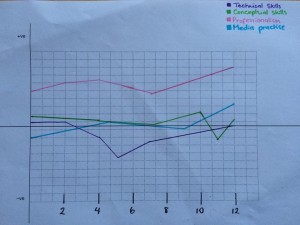I began this semester with some idea of where I wanted to go, and what I wanted to do with my life. I realise now that there are so many options, and now I know even less about that then before. I have been able to practise with a few basic aspects, and this I’ve been able to determine what I like, and what I’m not so sure of. Something else I have learned is how to use editing software such as Adobe Premier. When I first tried it I was incredibly frustrated. I had my slow and ancient computer, which didn’t handle it very well, and took it’s time completing the smallest action. However as I experimented with it a little more, I got used to it and became comfortable with the idea of editing on something that wasn’t iMovie. I actually tried to use iMovie to quickly cut down some footage, I discovered that I now preferred Premier to iMovie. I wouldn’t say I’m a pro at it, there’s still so many things I need to learn, but I’m definitely happy with where I am now in relation to understanding Premier. In contrast to this, I’m still not sure about Audition. I was away for the audio interview we did in class so I had to do it later. Because of this, I was only able to experiment with it very quickly, it seemed to take so long to edit thirty seconds worth of audio. I’m sure with more practise, I’ll feel more confident with it. Something that also came to light through the semester was how I learn.
I used to think I was one of those lucky people who could learn equally as well by theory and practical work, but this semester helped bring to light that I’m much more confident when I’m creating something. Although I was okay doing theory work, I could understand them fairly well, it was when we were doing practical work such as the haiku and audio interview , that I felt like I was learning something solid. I also work much better, and feel more confident when I’m working in a group. I enjoyed making the self portraits, however found group work more enjoyable. I think working in a group is so much better because there are so many ideas and possibilities to work with. It’s easy to share your own ideas and get feedback, and it’s also nice to learn and share each other’s knowledge. I feel like my most successful work (over all my classes) have involved group work. My favourite production so far is the ‘Surviving University’ interviews that were done as a production exercise. While I was working individually I often felt worried that I had interpreted the brief completely differently, being in a group meant that there were people there to reinforce my ideas or set them straight.
There were only a few things that really stuck out as challenging. The biggest for me was maintaining my blog. Four posts a week seemed like a lot, and even though there were so many readings, lectures and workshop activities I found myself not knowing what to write or how to write it. This resulted in a bad habit of keeping drafts right up until the posts were due. For the first three project briefs I also felt as though I wasn’t as creative as I could’ve been, I didn’t experiment or test myself with how I can present my work. I think a lot of these problems was due to the fact that I didn’t really do any pre-planning or organising. I usually just went with the flow and I think this limited my creative process and the final piece. Something else I noticed was how fast the semester went by. Last year in VCE, everything was paced slowly, we worked on a single topic for at least three weeks before moving on to the next. The pace of this semester seemed so fast, every week there is so there was a lot to take in, and I feel like I wasn’t able to truly grasp a concept, unless it was something that interested me personally.
Looking back on the past semester, I now understand what I’m best at and what I need to work on. Although it seemed very fast paced, and the twelve weeks went by so quickly, I was able to work on my own personal goals and experiment with the thing’s I’m interested in. I really enjoyed every second (even the stressful ones). It opened my eyes to a lot of ideas and possibilities and I’m excited to see how I go next semester, and in the future.


